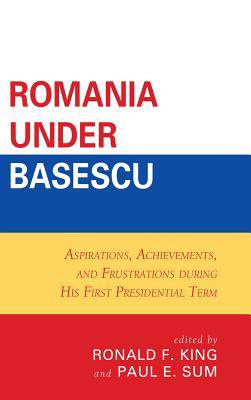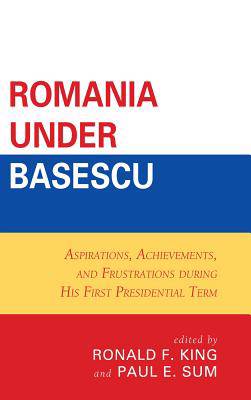
- Retrait gratuit dans votre magasin Club
- 7.000.000 titres dans notre catalogue
- Payer en toute sécurité
- Toujours un magasin près de chez vous
- Retrait gratuit dans votre magasin Club
- 7.000.0000 titres dans notre catalogue
- Payer en toute sécurité
- Toujours un magasin près de chez vous
Romania Under Basescu
Aspirations, Achievements, and Frustrations During His First Presidential Term
Ronald F King, Paul E Sum
Livre relié | Anglais
215,45 €
+ 430 points
Description
Traian Basescu was elected president of Romania in December 2004 on a platform promising political reform and economic revitalization. To many, Basescu's election signaled the final defeat of the communist-successor political party and the end of the difficult transition period from authoritarianism to full democratization. Romania under Basescu: Aspirations, Achievements, and Frustrations during His First Presidential Term, edited by Ronald F. King and Paul E. Sum, examines the complex and contradictory mixture of societal reactions during this period. It was a time in which Romania finally joined the European Union and was included fully among the European family of nations, yet it was also a period remarkable for bitter political controversy and limited reform success. Romania under Basescu is comprised of seventeen contributions from scholars in Europe and North America, examining the Basescu period from a variety of theoretical and empirical perspectives. Of particular importance is the contribution by Vladimir Tismaneanu, named by President Basescu to chair the Presidential Commission for the Analysis of the Communist Dictatorship, which addresses the importance of memory and truth-telling as a means of mastering the past and advancing to the future. Ronald F. King and Paul E. Sum, in their introduction, develop the concept of "Triage Democratization" to help explain the inconsistent and uneven pace of Romanian democratization. With separate sections addressing issues of governance, civil society, and public policy, Romania under Basescu highlights a central paradox of post-communist Romanian development: having one foot stretching toward the future and the other rooted firmly in the past.
Spécifications
Parties prenantes
- Auteur(s) :
- Editeur:
Contenu
- Nombre de pages :
- 388
- Langue:
- Anglais
Caractéristiques
- EAN:
- 9780739148563
- Date de parution :
- 14-06-11
- Format:
- Livre relié
- Format numérique:
- Genaaid
- Dimensions :
- 155 mm x 231 mm
- Poids :
- 739 g

Les avis
Nous publions uniquement les avis qui respectent les conditions requises. Consultez nos conditions pour les avis.






